Listed below, Naval Science & Technology Professional Development Seminar Distinguished Speakers, Fall Semester 2019.
Human-Centered Multidisciplinary STEM
Sonalysts - September 18, 2019
Presenters:
- Steve Dorton- V.P. Research & Development, Director- Human-Autonomy Interaction Laboratory
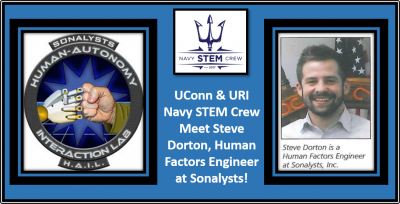
Description:
As systems continue to become more complex and interconnected, the development of effective solutions will increasingly rely upon two key approaches. First, we must remember the human that will ultimately interact with the system, and explicitly engineer systems that complement the strengths and weaknesses of the human that uses them. Second, we must leverage multidisciplinary approaches, as approaches that do not consider the computational and social sciences will be inadequate. We will discuss multiple R&D projects spanning domains of war gaming, crowdsourcing, and argumentation, highlighting the criticality of different STEM disciplines in the success of each.
Designing Reliable, High Performing Autonomous Systems for a Underwater Environment
Bluefin Robotics - September 25, 2019
Presenters:
- Hanna Thomas- UUV IPT Lead
Description:
Bluefin Robotics designs and produces UUVs of several sizes (9-inch, 12-inch, and 21-inch in diameter) for various applications (mine warfare, research, locating undersea debris, classified programs, etc.). In this presentation, Hanna will discuss the challenges of operating in a marine environment: namely corrosion, navigation, material selection, and pressure. She will also give an overview on the products that Bluefin Robotics develops, specifically the Knifefish Surface Mine Countermeasure System. This presentation will also cover some of the opportunities that are available at Bluefin Robotics and General Dynamics, what majors are accepted, and the types of projects that are carried out at the Bluefin Robotics facility.
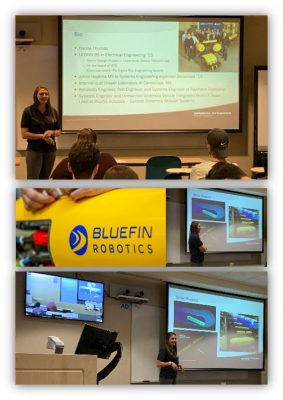
Applications of Today’s 3D Forward Looking Sonar for Real-Time Navigation & Bathymetric Survey
Farsounder - October 9, 2019
Presenters:
- Matthew Zimmerman- VP of Engineering
Description:
Currently, the main application of commercially available three dimensional forward looking sonar (3D FLS) technology is for real-time vessel navigation. Using 3D FLS technology, the vessel operator can detect not only the range and bearing to a navigational hazard, but also the depth of the hazard in the water column. However, 3D FLS is itself a nascent technology for which many exciting applications are yet to be realized. In this presentation, the current applications of 3D FLS will be surveyed, and some useful metrics for the evaluation of a 3D FLS will be discussed. New possible applications of 3D FLS will also be introduced.
The Navy’s Undersea Dominance with Nuclear Power
Navy Recruiting District New England - October 16, 2019
Presenters:
- LT Caitlin Tye- Surface Warfare Officer
- LT Timothy Omlor- Submariner
Description:
The United States Navy conducts a multitude of missions that help keep the U.S. safe, keep seaways clear for trade and deter nuclear war. Specifically, our Nuclear Navy is essential to maintaining our endurance at sea to keep us forwardly deployed. Nuclear Trained Officers help to do this by operating our nuclear power plants on board submarines and air craft carriers. These officers can also help to teach future nuclear students before heading to the fleet as well as helping to design and implement the nuclear plant and systems connected to it.
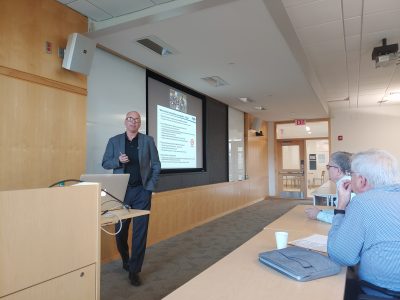
Hey Siri… What are the Enemy Ships? The Navy’s Interest in Big Data
In-Depth Engineering - October 23, 2019
Presenters:
- William Matuszak- Vice President
Description:
Big data is a 130 billion dollar industry. It promises to drive our cars, order our groceries and maybe even fight our wars. Eighty five percent of big data analytic projects fail, yet the US military desperately wants this technology incorporated in its systems. Can computers autonomously operate our weapons effectively? Can machine learning algorithms predict hostile military actions? Can data mining of benign sources combine to generate sensitive military intelligence? Military budget makers say yes, but some ethicists and critics of the technology hope the answer is no. This brief will review both successful and failed big data projects and discuss the implications for military use. It will review Navy Artificial Intelligence focus areas and discuss ethical issues associated with big data.
“Imagination is More Important Than Knowledge” -Einstein
LBI Corp - October 30, 2019
Presenters:
- Jim Rosenberger- Manufacturing Engineer
Description:
Naval research is not only fulfilling, but also very interesting. Working along side the U.S. Navy opens the door to immerse into the industry with the opportunity to express your own creativity and push boundaries. LBI has vast experience working in this sector, with a focus in, but certainly not limited to, Unmanned Underwater Vehicles (UUVs). Every project has a story to tell and, in this presentation, LBI will cover a couple of their research and development endeavors including their Arctic excursion with the AXIB buoy along with a couple ongoing creative innovations.
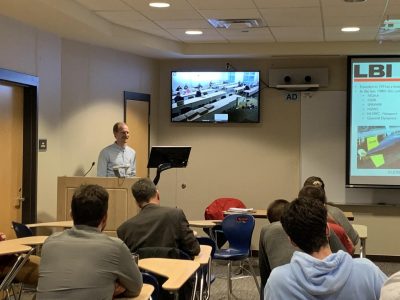
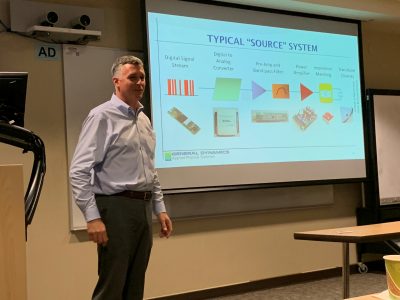
Did You Hear That?!
General Dynamics Applied Physical Sciences Corp. - November 6, 2019
Presenters:
- Bruce Abraham- VP & Chief Technology Officer
Description:
The core enabling technology in many U.S. Navy systems is the conversion of underwater sound to a detectable electrical signal or generation of sound from an electrical power source. Basic sensing (receiver/passive) and source (transmitter/active) system architectures are reviewed. Examples of passive acoustic marine mammal signatures, active detection of dolphins and behavioral response acoustic source systems are presented.
Applications of Mechanical Engineering Design
Naval Undersea Warfare Center - November 13, 2019
Presenters:
- Dr. David Bamford
Description:
Mechanical engineering design projects utilize most aspects from engineering curriculum in academia. This presentation will cover most aspects of mechanical design from materials characterization testing, conceptual design, system integration, and analysis and testing. Examples of different applications involving materials testing, mechatronics, and prototyping will be discussed with engineering rationale. Distinct stages of the engineering process will be discussed with potential choices and the resulting paths forward.
A World Leader in Autonomous Maritime Surveillance
ThayerMahan - November 20, 2019
Presenters:
- Alex Lorman- Director & Maritime Engineering
Description:
ThayerMahan provides innovative systems and expertise, connected by a global data platform, to help to protect our nation and its vital interests. They design, manufacture and (when desired by their customers) operate systems to collect acoustic and electronic information on the world's oceans. These systems expand coverage for government and industry partners to protect borders, natural resources, and undersea infrastructure—and do so at extremely low cost compared to traditional monitoring assets.
A Recent Graduate’s Perspective on Navy Related R&D Careers
Naval Undersea Warfare Center Division Newport - December 4, 2019
Presenters:
- Lauren Marshall- Mechanical Engineering Analyst
Description:
This presentation aims to cover some of the opportunities for research and development careers in the Naval sector from a recent engineering graduate’s perspective. Lauren will discuss her most recent work in finite element analysis, including a broad overview of numerical methods and common challenges for computational engineers. She will also discuss the experimental interdisciplinary research she is involved in that investigates the effects of underwater explosions on the marine mammal melon, an echo-location organ in the head of some marine mammals. She will dive into soft tissue testing, the experimental challenges of working with hyperelastic materials, and how experimental data will be used to validate a finite element model of the melon during underwater blast scenarios. She will cover how her classes and experiences in her undergraduate and graduate studies have prepared her for a research-related career, and how current students can build their research and engineering skills. The talk will close with a discussion about graduate school for engineering, the research process, and opportunities to pursue a research-related career path in the Navy.
To view the full semester schedule, click here!